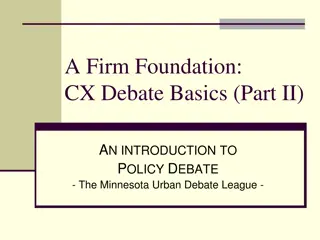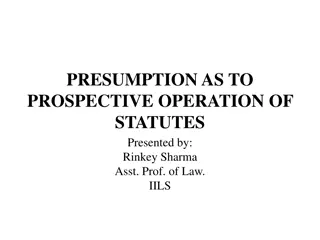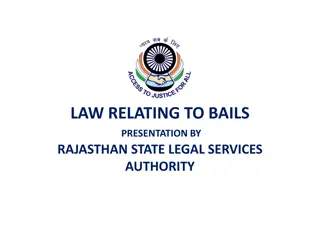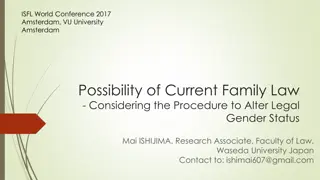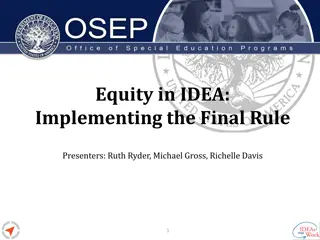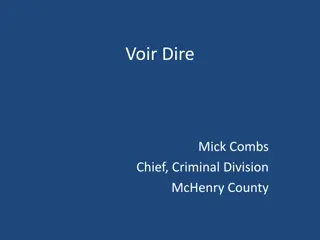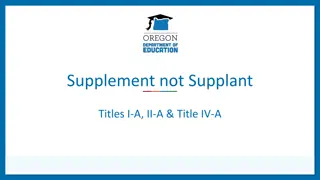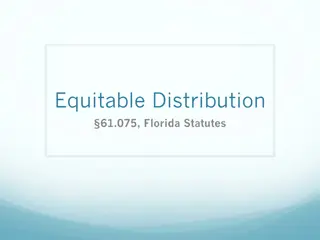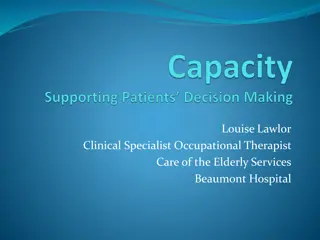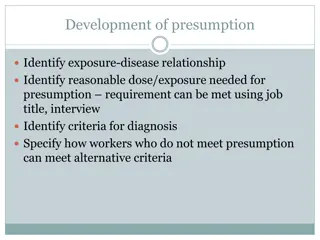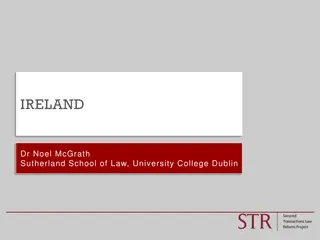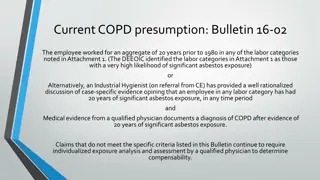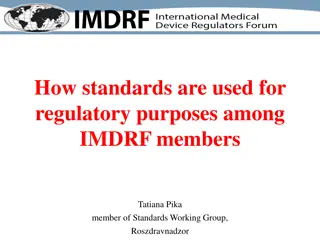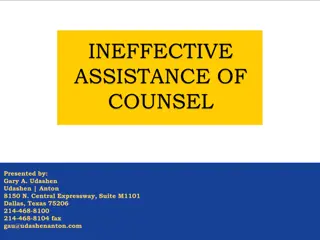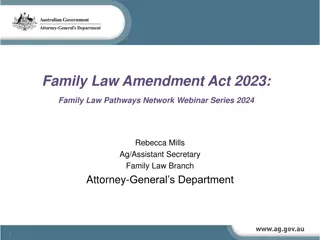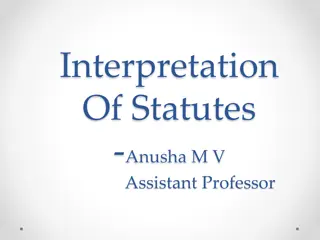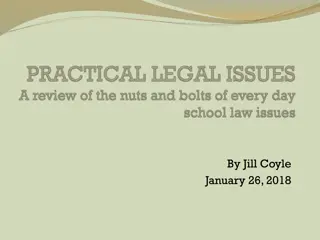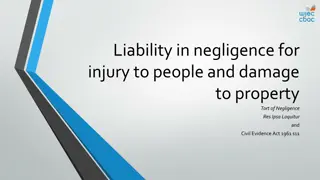RIGHT TO A FAIR TRIAL
The right to a fair trial is fundamental, encompassing aspects such as public hearings, independent tribunals, legal assistance, and the presumption of innocence. Legal frameworks, including the ECHR, the EU Charter of Fundamental Rights, and the U.S. Constitution, provide essential protections to u
3 views • 31 slides
Understanding Policy Debate Basics: Topicality, Presumption, and Case Construction
Explore the nuances of policy debate focusing on topicality, presumption, and case construction. Learn how debaters analyze the resolution, argue definitions, and use standards to ensure fairness in debates. Dive into the essential components of the First Affirmative Constructive (1AC) and how obser
0 views • 18 slides
Principles of Prospective Operation of Statutes in Legislation
Jurisprudence upholds the rule against retrospective legislation to protect settled matters and individual rights. The presumption is that laws should be prospective to avoid disrupting existing legal relationships. However, legislatures possess the power to enact retrospective laws, subject to cert
0 views • 16 slides
Understanding Bail Laws: Key Points and Constitutional Guarantees
Bail laws in India, specifically the provisions under the Code of Criminal Procedure, 1973, aim to balance societal protection and individual freedom. The concept of bail is intricately tied to the Fundamental Right to life and personal liberty enshrined in Article 21 of the Constitution. This summa
0 views • 13 slides
Possibility of Current Family Law in Addressing Legal Gender Status Changes
This presentation by Mai Ishijima explores the potential interim solutions that current family law could offer for newly-recognized parent-child relationships, particularly in abolishing requirements like physical modifications and sterilization in legal gender status alteration processes. It delves
0 views • 12 slides
Understanding Hindu Joint Family and Partition Laws in India
In India, there is a presumption that every Hindu family is joint. The Hindu joint family system is unique to Hindu society, consisting of the common ancestor, descendants, wives, and unmarried daughters. This article explores the composition of joint families, corporate personality, Hindu Undivided
0 views • 37 slides
Equity in IDEA: Implementing the Final Rule Presentation
Recap the final rule on equity in IDEA, focusing on standard methodology, remedies, important dates, and addressing questions. Discuss the methodology requirements, including data collection on disproportionality and disciplinary actions. Explore the standard methodology components, like risk ratios
0 views • 49 slides
Voir Dire in the Criminal Division of McHenry County
This text provides detailed information about the process of voir dire, specifically in the Criminal Division of McHenry County. It covers the Supreme Court Rule 431(a) regarding the examination of potential jurors, Zehr Principles, and Peremptory Challenges. The content emphasizes the importance of
3 views • 20 slides
Understanding Supplement, Not Supplant Requirements in Education Funding
Explore the concept of supplementing state and local education funds with federal grants, avoiding supplanting. Learn how to overcome the presumption of supplanting and meet Title I-A fiscal tests for educational funding compliance.
2 views • 15 slides
Understanding Equitable Distribution in Florida
Equitable distribution in Florida, governed by statutes 61.075 and 61.076, determines the fair division of marital assets and liabilities in divorce cases. Key considerations include identification, valuation, distribution presumption, and justification for unequal distribution. Assets are classifie
0 views • 28 slides
Understanding Legal and Mental Capacity in Healthcare Decisions
Clinical specialist occupational therapist, Louise Lawlor, advocates for patients' rights and decision-making capacity in healthcare settings. She emphasizes the importance of legal and mental capacity in making informed decisions, highlighting relevant legislation, guidance documents, and a functio
0 views • 24 slides
Green Belt Planning Guidelines and Inappropriate Development Overview
Green Belts serve key purposes in urban planning to curb sprawl, protect countryside, and preserve historic town settings. National policies like the NPPF emphasize the permanence and openness of Green Belts. Inappropriate development is heavily discouraged in Green Belts, with stringent criteria fo
2 views • 10 slides
Development of Presumption Criteria for Solvent-Induced Hearing Loss
Development of a presumption criteria by the Department of Labor (DOL) for identifying the exposure-disease relationship in cases of solvent-induced hearing loss. The DOL requires a diagnosis of sensorineural hearing loss in both ears, exposure to specific solvents, and a history of working in desig
0 views • 7 slides
Lessons from the Salem Witch Trials
The Salem Witch Trials in 1692 were a dark period in American history where many were accused of witchcraft based on superstitions and hysteria. Accusations were unfair and people were condemned without proper evidence. Lessons learned include the importance of the right to a fair trial, the presump
0 views • 6 slides
The Assisted Decision-Making (Capacity) Act 2015 in the Criminal Justice Context
The Assisted Decision-Making (Capacity) Act 2015 introduces key reforms such as the abolition of wards of court system for adults, a statutory functional test of capacity, new guiding principles, a three-tier framework for support, and tools for advance planning. It emphasizes functional assessment
0 views • 17 slides
Reform Process in Ireland: Company Law Changes
Explore the reform process in Ireland regarding the Company Charge Register, registration system, certificates, priorities, and negative pledge clauses. Changes include the presumption of registrability for mortgages, criminal sanctions abolition, and modifications in registration procedures.
0 views • 7 slides
COPD Presumption Criteria for Asbestos Exposure Workers
The COPD presumption criteria outlined in Bulletin 16-02 require employees who worked in specific labor categories with significant asbestos exposure prior to 1980 for a total of 20 years to be considered for benefits. This bulletin aims to support individuals who may have developed COPD due to thei
0 views • 7 slides
Update on Lung Conditions Subcommittee of Advisory Board on Toxic Substances and Worker Health
The Lung Conditions Subcommittee conducted a review of 80 Part B cases related to various respiratory conditions in workers. The review highlighted common reasons for incorrect adjudications, such as misapplications of presumption criteria and unclear decisions on beryllium exposure. Conclusions rev
0 views • 21 slides
Usage of Standards for Regulatory Purposes Among IMDRF Members
Standards play a vital role in regulatory practices within the IMDRF, utilized to ensure conformity with safety and performance principles in medical devices. The Standards Working Group comprises members from various countries, overseeing the recognition and revision of standards to align with inte
0 views • 17 slides
Overview of Strickland v. Washington and Ineffective Assistance of Counsel
Strickland v. Washington establishes a two-part test for determining ineffective assistance of counsel. The test requires a showing of deficient performance and resulting prejudice to the defendant. Appellate courts must presume counsel's conduct was reasonable unless proven otherwise. Challenges to
0 views • 42 slides
Overview of Family Law Amendment Act 2023 Changes
The Family Law Amendment Act 2023 introduces significant changes to the family law system, affecting separated parents and professionals working with them. It simplifies the parenting framework, amends factors for determining child's best interests, removes shared parental responsibility presumption
0 views • 28 slides
Role of Supreme Courts in Ensuring Effective Judicial Systems in the European Union
This communication focuses on the vital role of Supreme Courts in guaranteeing the effectiveness of judicial systems within the European Union. It delves into the significance of courts' communication strategies, emphasizing accessibility of justice, trust-building, and public image. The discussion
0 views • 29 slides
Understanding Statutes: An Overview by Anusha M.V., Assistant Professor
This collection of images provides an insightful overview of statutes, covering their definition, creation process, commencement, operation, presumption against retrospective operation, repeal, and consequences of repeal. It explains the key aspects of statutes in a clear and concise manner.
0 views • 60 slides
Presumption of Innocence in EU Directive 2016/343 Explained
This article delves into the essential aspects of the presumption of innocence as outlined in EU Directive 2016/343. It covers the scope of application, burden of proof, right to silence, and other related provisions. The text emphasizes the significance of treating individuals as innocent until pro
0 views • 14 slides
Parental Rights and Responsibilities in Educational Settings
Explore key topics such as responding to parental disagreement, abuse and neglect reports, student discipline, data privacy, discrimination, bullying, special education disputes, custody rights, and access to student records as per Minnesota statutes. Understand the presumption of parental right to
0 views • 46 slides
Understanding Res Ipsa Loquitur in Negligence Law
Res Ipsa Loquitur is a legal principle where the occurrence of an accident implies negligence by the defendant. This doctrine creates a presumption of fault against the defendant, who must then offer an explanation to rebut this presumption. The case of Scott v. The London and St. Katherine Docks Co
0 views • 15 slides

